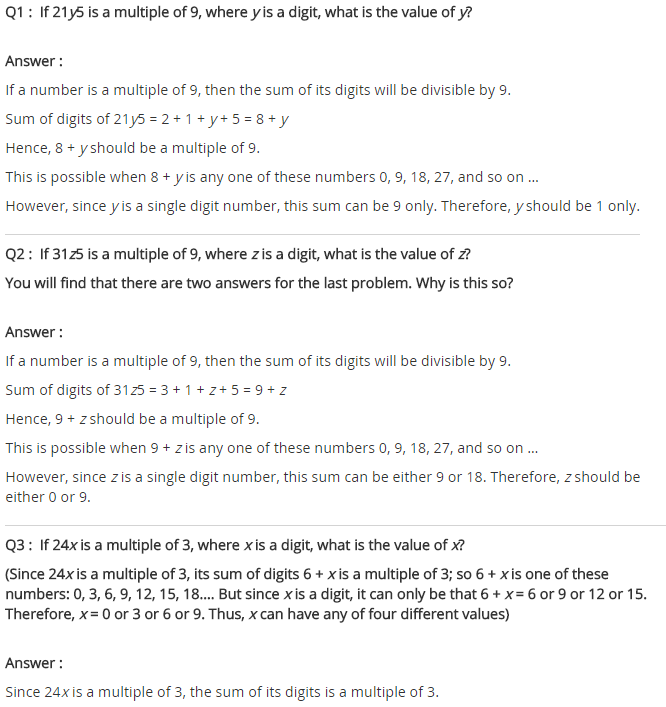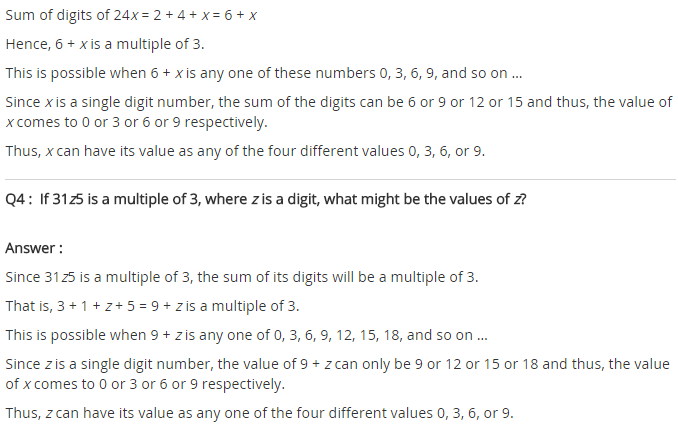Question 1.
If 21y5 is a multiple of 9, where y is a digit, what is the value of y?
Solution:
A number is divisible by 9 if the sum of its digits is also divisible by 9.
Sum of the digits of 21y5 = 2 + 1 +y + 5 = 8 + y
(8 + y) ÷ 9 = 1
⇒ 8 + y = 9
⇒ y = 9 – 8 = 1
Hence, the required value of y = 1.
Question 2.
If 31z5 is a multiple of 9, where z is a digit, what is the value of z?
Solution:
A number is a multiple of 9 when the sum of its digits is also divisible by 9.
Sum of the digits of 31z5 = 3 + 1 + z + 5
3 + 1 + 2 + 5 = 9k where k is an integer.
For k = 1,
3 + 1 + z + 5 = 9
⇒ z = 9 – 9 = 0
For k = 2,
3 + 1 + z + 5 = 18
⇒ z = 18 – 9 = 9
k = 3 is not possible because 3 + 1 + z + 5 = 27
⇒ z = 27 – 9 = 18 which is not a digit.
Hence the required value of z is 0 or 9
Question 3.
If 24x is a multiple of 3, where x is a digit, what is the value of x?
Solution:
Since 24x is a multiple of 3, the sum of digits 6 + x is a multiple of 3; so 6 + x is one of these numbers; 0, 3, 6, 12, 15, 18, ……..
6 + x = 3k where k is any integer.
For k = 0,
6 + x = 3 × 0
⇒ 6 + x = 0
x = -6. Not possible
For k = 1,
6 + x = 3 × 1
⇒ 6 + x = 3
⇒ x = 3 – 6 = -3. Not possible
For k = 2,
6 + x = 3 × 2
⇒ 6 + x = 6
⇒ x = 6 – 6 = 0
2 + 4 + 0 = 6 multiple of 3
For k = 3,
6 + x = 3 × 3
⇒ x = 9 – 6 = 3
2 + 4 + 3 = 9 multiple of 3
For k = 4,
6 + x = 3 × 4
⇒ 6 + x = 12
⇒ x = 12 – 6 = 6
2 + 4 + 6 = 12 which is multiple of 3
For k = 5,
6 + x = 3 × 5
⇒ x = 15 – 6 = 9
2 + 4 + 9 = 15 which is multiple of 3
For k = 6,
6 + x = 3 × 6
⇒ x = 18 – 6 = 12 not possible as x is digit
Hence the required values of x are 0, 3, 6 or 9.
Question 4.
If 31z5 is a multiple of 3, where z is a digit, what might be the value of z?
Solution:
A number is a multiple of 3 if the sum of its digits is divisible by 3.
3 + 1 + z + 5 = 3k where k is an integer
⇒ 9 + z = 3k
⇒ z = 3k – 9
Here, k = 0, 1, 2 is not possible as z is a digit of the number.
For k = 3,
z = 3 × 3 – 9 = 9 – 9 = 0
9 + 0 = 9 multiple of 3
For k = 4,
z = 3 × 4 – 9 = 12 – 9 = 3
9 + 3 = 12 multiple of 3
For k = 5,
z = 3 × 5 – 9 = 15 – 9 = 6
9 + 6 = 15 multiple of 3
For k = 6,
z = 3 × 6 – 9 = 18 – 9 = 9
9 + 9 = 18 multiple of 3
For k = 7,
z = 3 × 7 – 9 = 21 – 9 = 12 not possible as z is a digit
Hence, the required values of 2 are 0, 3, 6 and 9.


